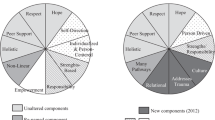Abstract
New approaches for preventing repeated inpatient psychiatric stays, detention in jails and prisons, and homelessness among individuals with serious mental illnesses with established histories of such recidivism, while promoting recovery, are direly needed. We present findings from an initial program evaluation of a new community-based, recovery-oriented “community navigation” program in southeast Georgia, called Opening Doors to Recovery. Twenty-three in-depth interviews were conducted with key stakeholders, program participants, community navigation specialist team members, and referring mental health professionals to identify hopes and strengths, challenges and weaknesses, and recommendations pertaining to the new program. Cited strengths included teamwork and pooling of resources from various partners, as well as the novel recovery-based, community navigation team approach. An initial lack of fidelity processes across teams and an ongoing scarcity of safe and affordable housing were identified as weaknesses, with the latter seen as a liability of the overall mental health and social service systems rather than the program itself. Findings from this evaluation highlight strengths and opportunities of this new community navigation approach, including those related to the involvement of certified peer specialists and multiple community partners.
Similar content being viewed by others
References
Anthony WA: Recovery from mental illness: The guiding vision of the mental health service system in the 1990s. Psychosocial Rehabilitation Journal 16:11–23, 1993.
Stroup TS, Morrissey JP, Ellis AR, Black M: Correlates of family burden under medicaid managed mental health care. Administration and Policy in Mental Health 29:117–28, 2002.
NAMI Policy Research Institute: http://www.nami.org/Content/NavigationMenu/Inform_Yourself/About_Public_Policy/Policy_Research_Institute/NAMI_Policy_Research_Institute.htm, 2012. Accessed 13 June 2013.
Struening EL, Perlick DA, Link BG, Hellman F, Herman D, Sirey JA: The extent to which caregivers believe most people devalue consumers and their families. Psychiatric Services 52:1633–8, 2001.
Freuh BC, Grubaugh AL, Lo Sasso AT, Jones WJ, Oldham JM, Lindrooth RC: Key stakeholders’ perceptions regarding acute care psychiatry in distressed publicly funded mental health care markets. Acute Care Psychiatry 76:1–20, 2012.
National GAINS Center for People with Co-Occurring Disorders in the Justice System: The Nathaniel Project: An alternative to incarceration program for people with serious mental illness who have committed felony offenses. Program Brief Series. Delmar, NY, 2002.
Mead S, Copeland ME: What recovery means to us: Consumers’ perspectives. Community Mental Health Journal 36:315–28, 2000.
Whitley R, Strickler D, Drake RE: Recovery centers for people with severe mental illness: A survey of programs. Community Mental Health Journal 48:547–56, 2012.
Compton MT, Hankerson-Dyson D, Broussard B, Druss BG, Haynes N, Strode P, Grimes C, Li C, DiPolito JA, Thomas GV: Opening Doors to Recovery: A novel community navigation service for people with serious mental illnesses. Psychiatric Services 62:1270–2, 2011.
Badger K, Royse D: Helping others heal: Burn survivors and peer support. Social Work in Health Care 49:1–18, 2010.
Suls J, Martin R, Wheeler L: Social comparison: Why, with whom, and with what effect? Current Directions in Psychological Science 11:159–63, 2002.
Cook JA: Peer-delivered wellness recovery services: From evidence to widespread implementation. Psychiatric Rehabilitation Journal 35:87–9, 2011.
Chow W, Law S, Andermann L, Yang J, Leszcz M, Wong J, Sadavoy J: Multi-family psycho-education group for assertive community treatment clients and families of culturally diverse background: A pilot study. Community Mental Health Journal 46:364–71, 2010.
Salyers MP, McGuire AB, Rollins AL, Bond GR, Mueser KT, Macy VR: Integrating assertive community treatment and illness management and recovery for consumers with severe mental illness. Community Mental Health Journal 46:319–29, 2010.
Salzer MS, Schwenk E, Burilovskiy E: Certified peer specialist roles and activities: Results from a national survey. Psychiatric Services 61:520–3, 2010.
Druss BG, Bornemann TH: Improving health and health care for persons with serious mental illness: The window for US federal policy change. JAMA 303:1972–3, 2010.
Acknowledgments
This work was supported by a grant from the Bristol-Myers Squibb Foundation to the last author.
Author information
Authors and Affiliations
Corresponding author
Rights and permissions
About this article
Cite this article
Reed, T.A., Broussard, B., Moore, A. et al. Community Navigation to Reduce Institutional Recidivism and Promote Recovery: Initial Evaluation of Opening Doors to Recovery in Southeast Georgia. Psychiatr Q 85, 25–33 (2014). https://doi.org/10.1007/s11126-013-9267-1
Published:
Issue Date:
DOI: https://doi.org/10.1007/s11126-013-9267-1




